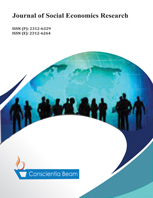The Relationship between the Empowerment of Women and Preferences Related to Fertility in Pakistan
DOI:
https://doi.org/10.18488/35.v9i2.3135Abstract
This study examines the relationship between women's empowerment and reproductive choices among married Pakistani women aged 15 to 49. The study utilized the most recent Pakistan Demographic and Health Survey 2017–2018 data. Four proxies were used to measure women's empowerment: spending on husbands' earnings, visits to family, major family purchases, and health care decisions. Health care choices and spending on the husband's salary are both greatly influenced by fertility. Binary logistic regression reveals a substantial and unfavorable link in connection with empowerment and the various education levels of children, males, and spouses. By focusing on this topic, this study can see beyond the constraints that currently exist in the relationship between women's empowerment and fertility preferences. The findings of this study suggest that female participation in the labor force is essential to preserving balanced reproduction and decision-making regarding the home.

